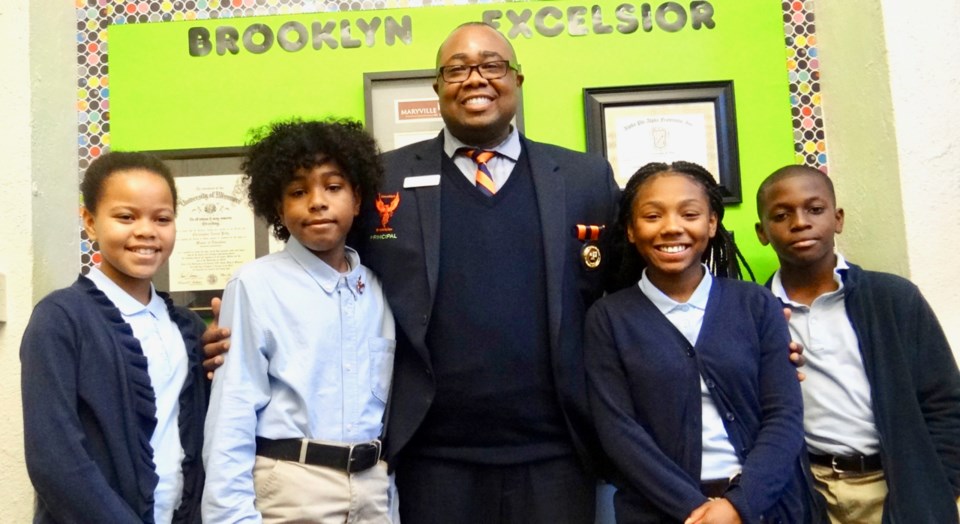Ten years ago, during the height of the national debate around the positive and negative impacts of charter schools in urban environments, critics had a pretty strong argument:
The argument was that, in urban centers, the practice of screening in the brightest and/or expelling the "problem" students served to further "ghetto-ize" the surrounding public schools. Free of public and governmental oversight, the disciplinary methods of charter schools also were often called into question. Furthermore, initial studies of the academic performance at urban charters often proved only marginally better but still fell far below the state's average.
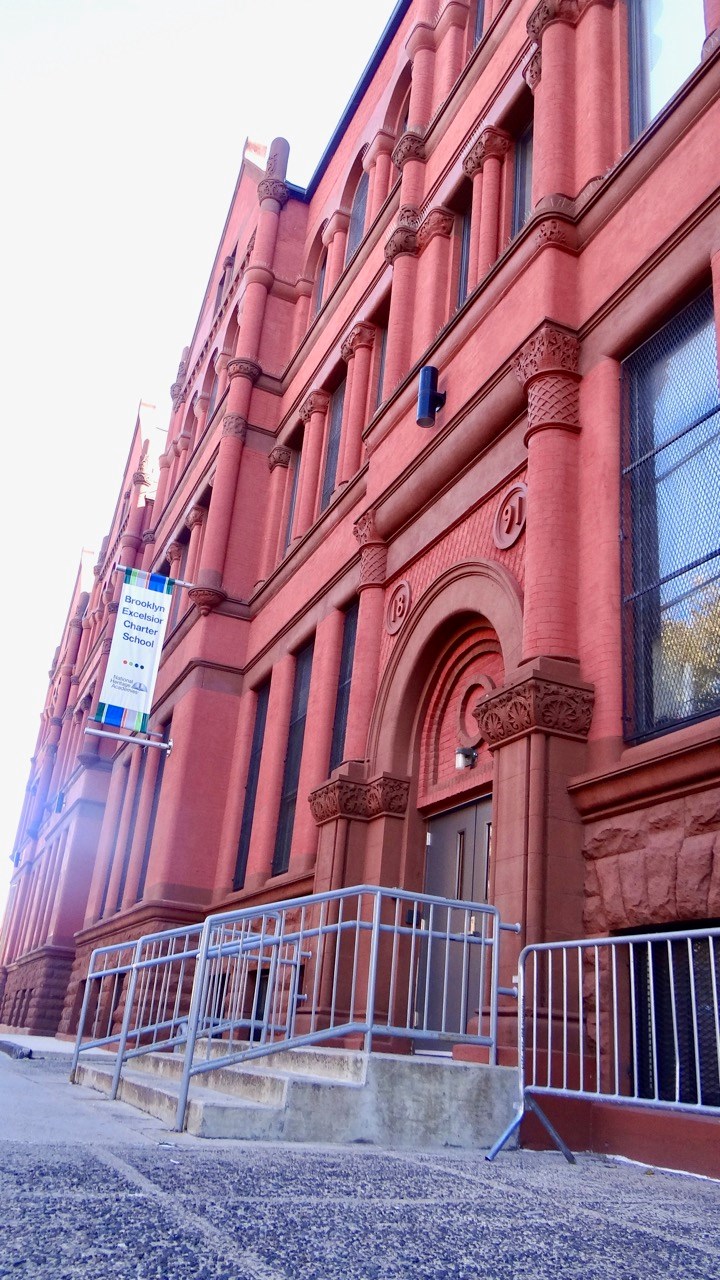
Take Brooklyn Excelsior Charter School, for example-- a K-8 charter school, located at 856 Quincy Street on the border of Bushwick and Bed-Stuy. BECS is a part of National Heritage Academies, a network of 87 charter schools across the country, three of which are located in Brooklyn. Founded in 2003, BECS's student makeup is 94 percent black and Hispanic, with most of its 640 students hailing from underserved areas.
In its first few years after opening, the school was, like most new charters back then, a beacon of hope and a breath of fresh air for parents who desired a safer, more structured and academically challenging environment for their child.
However, by 2010, the school had developed a public relations problem: Parents began writing in on comment boards, complaining about the school's disorganized staff; at-will instruction; questionable disciplinary measures; higher-than-average suspensions and less-than-impressive test scores-- not unlike the complaints at many urban-area charters around the country at that time.
"The building was in disarray," said Dr. Christopher Petty, principal of Brooklyn Excelsior Charter School. "The principals, the deans, assistant principals, the teaching staff... leadership period in the building was unstable."
Dr. Petty was brought on board to BECS in 2016, following his success in turning around Alliance Academy of Cincinnati, another National Heritage Academies school. Since his appointment, the school not only has made a comeback, it has surpassed all of its goals!
Over the last four years, Brooklyn Excelsior's state test proficiency rates in English Language Arts and Math have increased by 33 percentage points.
Additionally, more than 80 percent of BECS students this year outperformed their local district on the state proficiency exams in every grade and subject (ELA and Math), an improvement by more than 50 percent in less than three years! At the current rate of growth, that figure could reach 100 percent of students by as soon as next year-- all of this while not a single one of the students has been expelled.
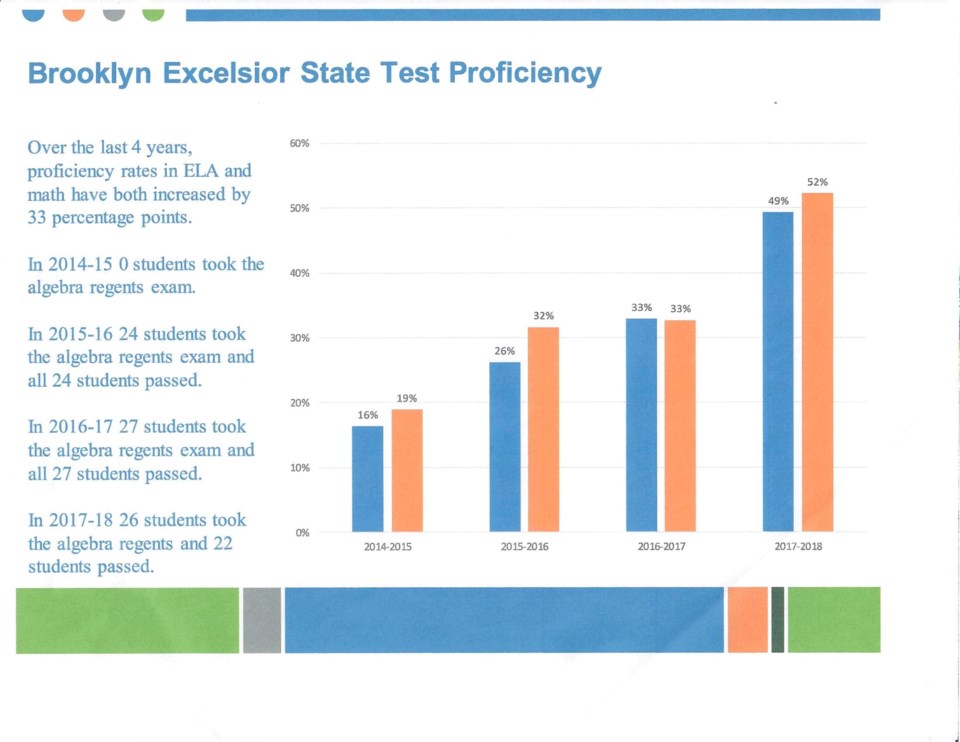
What was behind such a dramatic change?
"The first goal was to stabilize the leadership and create recorded systems," said Petty. "What happens every ten weeks when it's time to distribute report cards? What happens semester-one and semester-two when we conduct parent/teacher conferences? What happens at lunch duty? What happens for dismissal? There were no recorded documented routines or procedures anywhere."
The second goal was achieved through staff learning. NHA keeps an online portal accessible to staff whereby they can then track data in real time. The data is updated regularly and includes employee engagement, parent satisfaction, budget, attendance, disciplinary suspensions and of course academic performance. Dr. Petty, along with his staff, studied the school data objectively, mapped the results and began to make changes.
"Together, we figured out what is the something that the data is telling us, and then what direction do we need to go in to run the school," said Petty.
"All of the research is clear: When the student is engaged in high quality instruction, discipline problems significantly decrease, if they exist at all." ~ Christopher Petty, BECS Principal
That learning was facilitated by modeling what works and doesn't work at some of the other NHA schools located in distressed areas around the country: "We're in areas like New Orleans where Katrina hit, so there are multiple lessons to be learned from that; in Atlanta where the cheating scandal was, so there are a lot of lessons to be learned from that."
The school looks for teachers who can create a classroom culture where engagement is so high, disruptions are rare. Additionally, every teacher is required to chart and then post their classroom benchmarks on the wall so that students naturally begin to feel they are a part of that goal setting, while at the same time the school makes every effort in providing whatever resources teachers need to meet those goals.
"[NHA] actually has a funding formula where some of the extra money [we might need] comes from the other schools in the NHA network, so that we're funded in a way that allows us to compete," said Petty. "But all of the research is clear: When the student is engaged in high quality instruction, discipline problems significantly decrease, if they exist at all."
Jaelyn White, a 13-year-old honor roll student who is in her second year at BECS said she can sense the teachers care about her progress: "Teachers I had in the past seemed like they wanted to do it because they get paid for it. But here, you can tell their passion is to teach. They really want us to understand the work."
The third priority, said Petty, was to develop a relationship with the students individually. BECS does not screen its students, so the majority of them come directly from the neighborhood outside of the school's walls. And many of them are arriving from troubled, poor or unstable environments. Getting them to buy into a different set of rules and expectations meant creating a safe space for and gaining the trust of both the children and their parents.
"We have to spend the time hearing them out, whether they are right or wrong," said Dr. Petty. "Then we have to make sure they have space to vent through conflict mediation or counseling. We have to hold expectations high; and then we have to make sure that kids have a path to meeting those expectations."
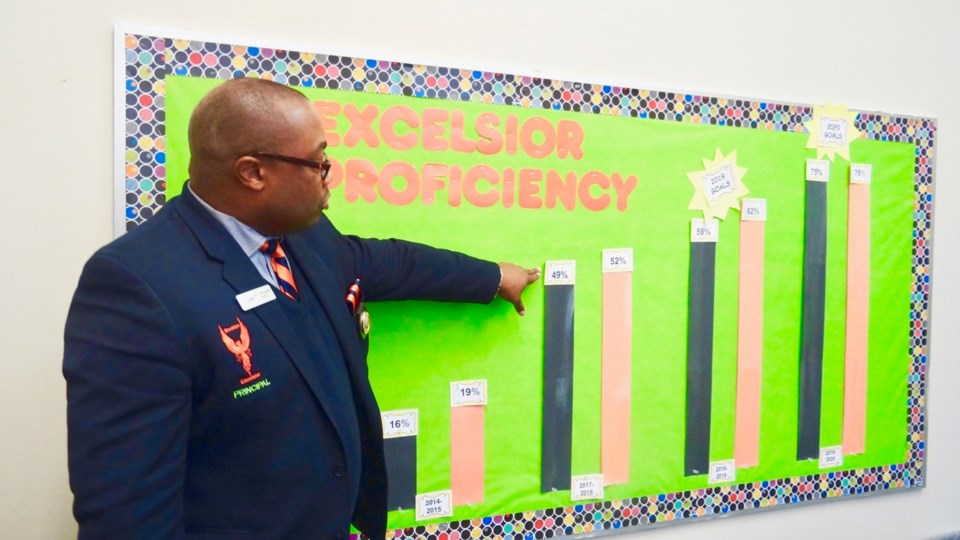
Roderick Hutcherson is the Student-Parent Liaison at BECS. He was hired, ironically, following a successful conflict resolution between him and his son's kindergarten teacher-- something he says was resolved because the school was willing to listen: "I enjoy the structure and, at the same time, the openness," said Hutcherson. "Working here has changed the way our home functions even and has propelled our family to a different bracket, financially and otherwise."
"One of the things we leverage," added Petty, "is encouraging kids to find a personality in the building that works for them. For some kids, that's Mr. Hutcherson. For some kids, that'll be me. For some kids, it'll be one of the secretaries sitting at the front desk. And pretty much, the whole staff knows that if you have that relationship with the child, then when there's an issue, we'll call you."
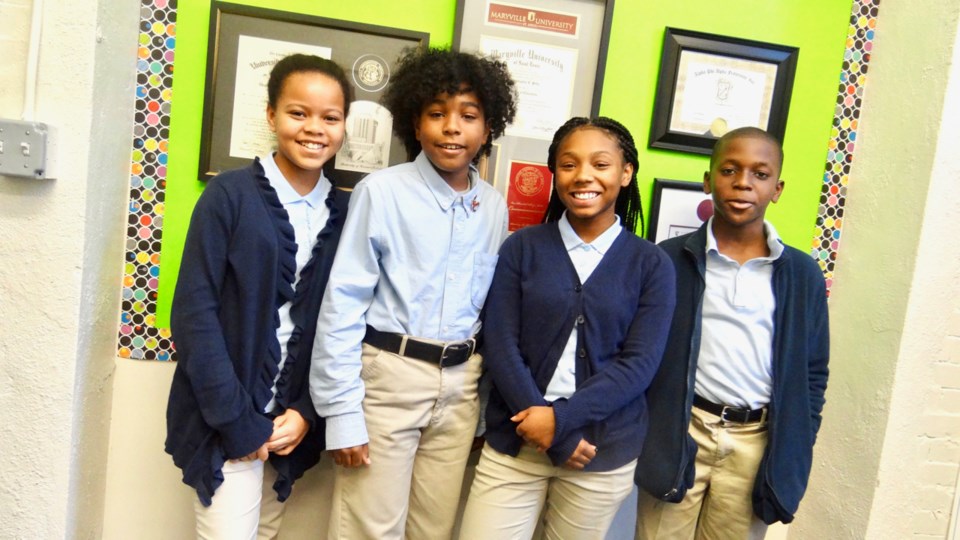
Interestingly, it seems, Brooklyn Excelsior is not the only charter school that is pulling ahead. A recent Stanford University study shows a sudden uptick in the performance of urban charter schools nationwide. The main reason, notes Margaret Raymond of Stanford University, is that regulators have shut down many of the worst-performing charters, which rarely happens with ineffective traditional schools.
The other reason, Raymond states, is because so many of the old charters have been overhauled and reformed. Enough time has passed and enough data has been collected for charters to figure out what they are doing wrong and then customize a fix!
Whether that fix addresses structure, quality of instruction, engagement, trust and safety or all of the above depends on the school's environmental needs.
"When I leave this school, I feel safe." said Carlos Simmons, 12, who is an honor roll student in his fourth year at BECS. "It's important, because I sometimes don't feel safe in my neighborhood. But if I feel safe, I can study and focus and do my best."
Still, one success factor that is universal and clear: Schools where students learn best are those where the instructors, the parents and the staff are committed to doing precisely the same.

